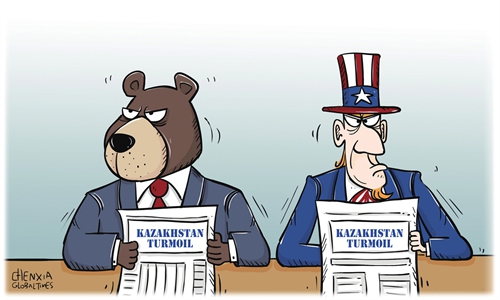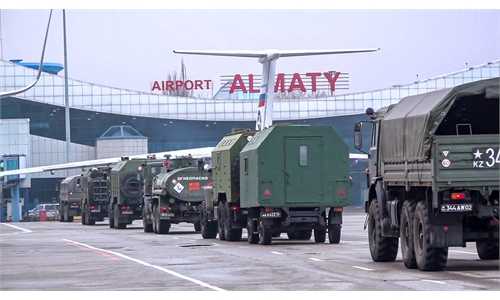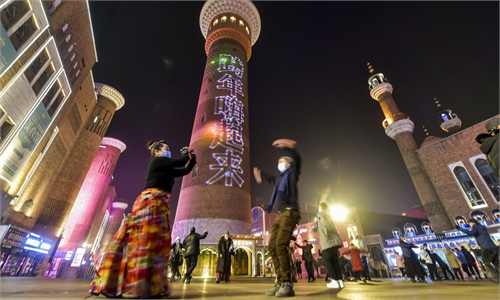IN-DEPTH / DIPLOMATIC CHANNEL
Extreme groups in Kazakhstan won’t spill over to border with China: ambassador
Hope restored
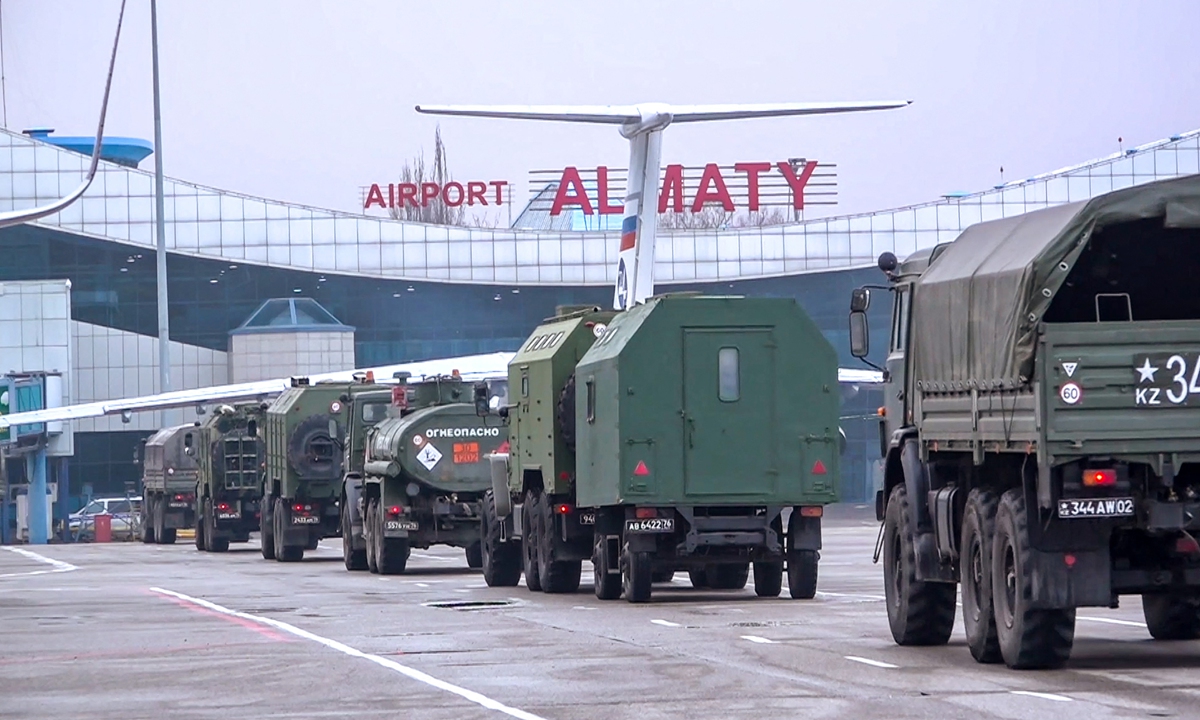
Military hardware are seen at the Almaty airfield as Russian peacekeepers arrive in Kazakhstan for a CSTO mission on January 9, 2022. Photo: IC
Kazakhstan's Ambassador to China, Gabit Koishibayev, confirmed that the extreme groups that Kazakhstan has been cracking down on amid domestic unrest run no risk of spilling over to Kazakhstan's border with China, and the government thanked China for providing decisive support in guarding regional peace and security at a media conference on Monday. The ambassador stressed they will wait for the ongoing domestic investigation to find out the causes and forces behind the turmoil.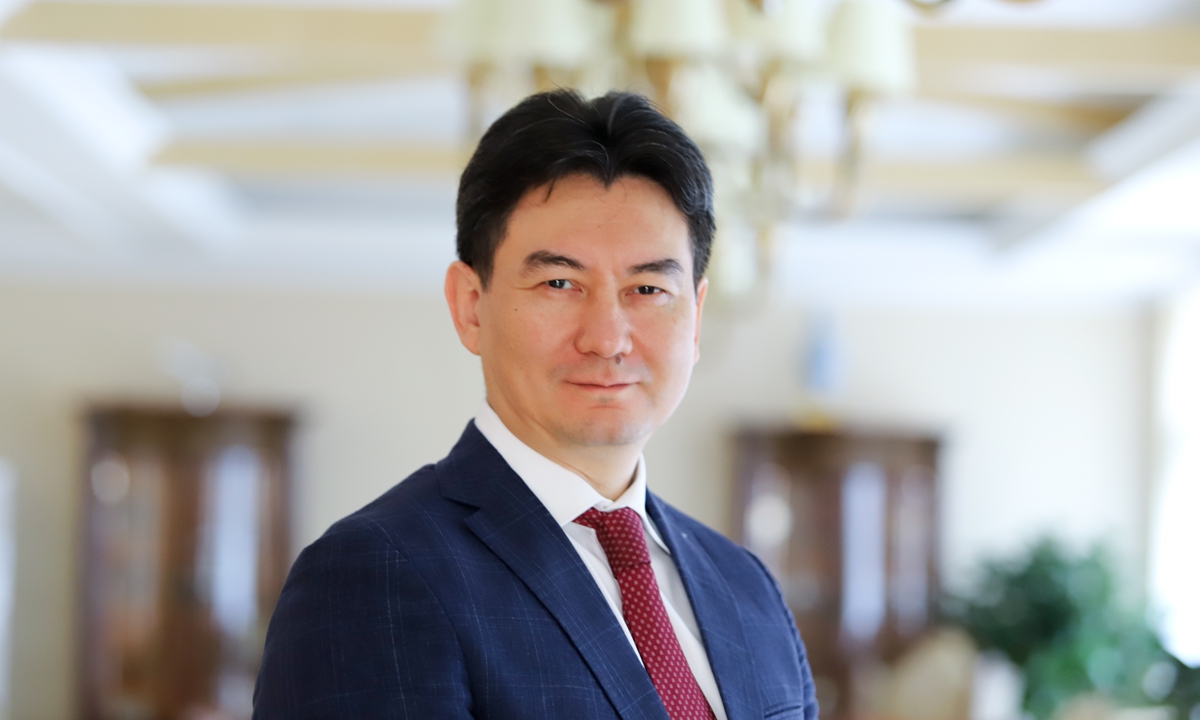
Kazakhstan's Ambassador to China Gabit Koishibayev. Photo: Courtesy of Embassy of Kazakhstan in China
The remarks came after the Chinese State Councilor and Foreign Minister Wang Yi's pledge of China's firm support to Kazakhstan's move to end violence in the country and safeguard security, during a phone call on the same day with Kazakh Deputy Prime Minister and Foreign Minister Mukhtar Tileuberdi.Kazakh authorities on Monday for the first time linked the violent protest to Islamist extremist groups, saying that preliminary data shows the attackers include individuals who have military combat zone experience in the ranks of radical Islamist groups, local media reported.
Koishibayev told the Global Times at the press conference on Monday that "terrorist organizations will not spill over to the China-Kazakhstan border and there is no such risk at present."
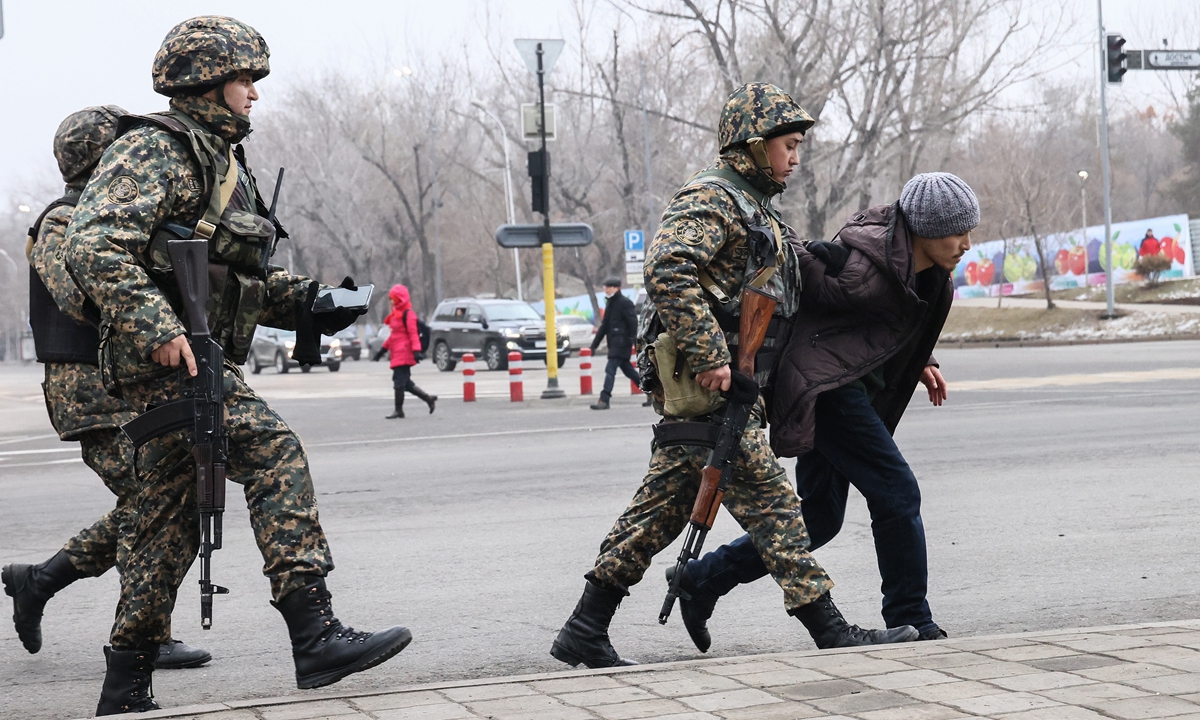
Kazakh servicemen detain a man on Nursultan Nazarbayev Avenue on January 10, 2022. Photo: IC
The Kazakh government is taking all necessary measures to protect the safety and property of Chinese nationals in Kazakhstan. Trade at its ports is also operating normally and has not been affected by the political situation in Kazakhstan, said the ambassador.The Collective Security Treaty Organization (CSTO) has deployed a peacekeeping force of 2,030 personnel and 250 military equipment to deescalate the situation, said Koishibayev. Kazakh President Qasym-Zhomart Toqaev has said in a televised address to parliament on Tuesday that troops from the CSTO will begin withdrawing from Kazakhstan in two days, and complete their withdrawal over the next 10 days.
"We will not allow the realization of so-called color revolution scenarios," Russian President Vladimir Putin said during Monday's videoconference of CSTO members, according to the state-run RIA Novosti news agency.
The state of emergency in Kazakhstan is expected to remain in place until January 19. The Kazakh government is expected to "learn lessons" from the unrest in order to further promote the legitimate rights of the people and the balanced development of the country, the ambassador noted.
Local police have arrested over 8,000 people including violent protesters and lawbreakers, but no Chinese nationals were among them, he stressed.
The ambassador also said that peaceful protests were hijacked by terrorist, extremist and criminal groups to escalate tensions and violence, and Kazakhstan has been subjected to armed aggression by well-coordinated terrorist groups trained abroad.
There was widespread speculation that the US was behind the violence and pulled the strings, though White House Press Secretary Jen Psaki refuted the accusations on January 5, calling rumors to the contrary "crazy Russian claims."
Koishibayev did not name any specific country or force behind the unrest, stressing to wait for domestic investigation conclusions at the press conference.
Law enforcement agencies in Kazakhstan have been instructed to conduct a large-scale investigation of the causes of the current situation, the results of which will be presented to the international community, said the ambassador.
Preliminary results suggest foreign influence behind the unrest, but it cannot be confirmed at the moment. Since its independence, Kazakhstan has pursued a multifaceted diplomatic policy and has been communicating with many parties, including high-level officials from the European Union, the United States and China, Koishibayev told the Global Times at the press meeting.
The ambassador called on the rest of the world to not judge the situation in Kazakhstan based on false information and predictions, but on official Kazakh statements. "There is a new way for activists to foment unrest. But with regards to their specific purposes, we still wait to see the results of the relevant investigation report," said the ambassador.
He said the press conference was held to clear some misrepresentations and biased reports in the foreign press on the situation that has developed in Kazakhstan since the introduction of the state of emergency.
Heighten measures to protect local Chinese
Government buildings across several local regions in Kazakhstan were set on fire and stormed last week as initially peaceful protests against fuel price increases became violent in the country.
The National Security Committee said on Monday that the situation had stabilized and that security forces had restored order, local media reported.
Internet service has been restored, while holidays for students have also been extended and social services have been on the way back, the ambassador told Chinese reporters on Monday.
Kazakh authorities are taking effective measures to stabilize the situation, prevent violence and guarantee the safety of foreign nationals. Protecting the legitimate rights and interests of foreign investors, including Chinese investors, remains one of the priorities of the Kazakh authorities under the current situation, the ambassador's statement said at a press conference.
Kazakh Invest, a state-owned corporation established by the government of Kazakhstan to attract high-quality inbound investments, has also set up a call center specifically for investors who encounter difficulties in their business activities, and information about it has been posted on the embassy website, the ambassador noted.
The ambassador acknowledged that goods at border ports between China and Kazakhstan had been logistically affected by the epidemic, and road transport has been greatly hindered. He called for more understanding and support from Chinese investors and traders, while appreciating China for its economic assistance to Kazakhstan.
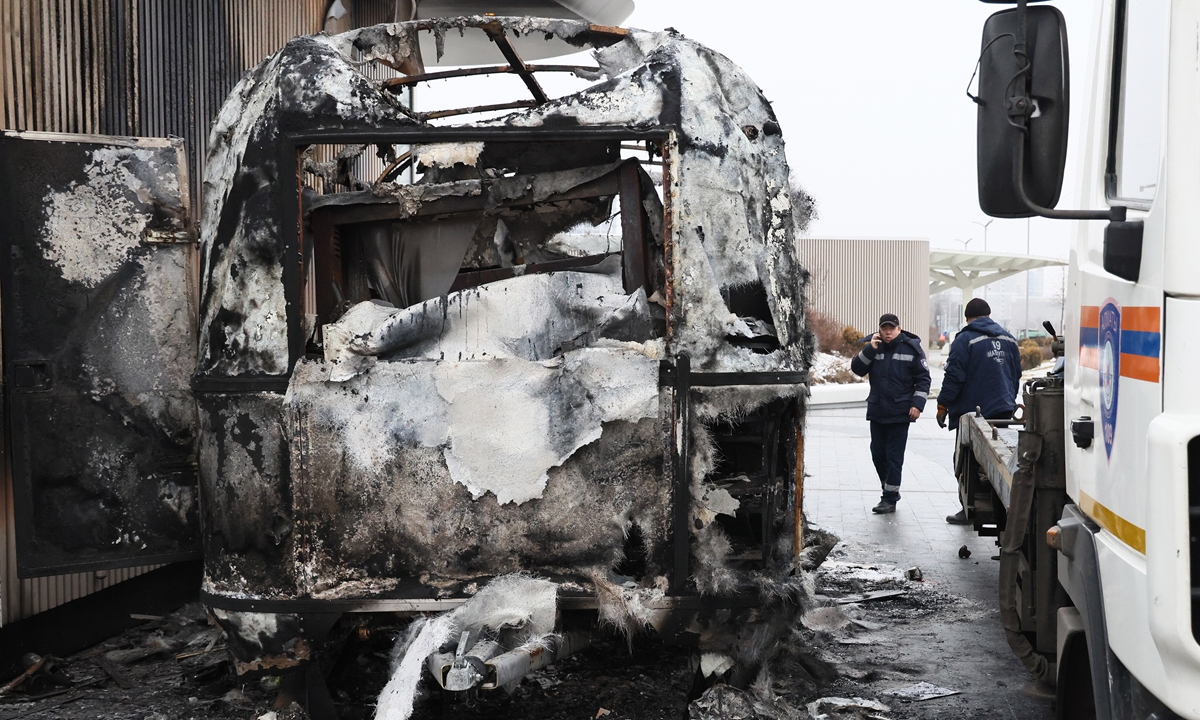
A view of the wreckage of a car burned during mass riots on January 10, 2022. Photo: VCG
The Kazakhstan ambassador also thanked Shanghai Cooperation Organisation (SCO) member states for their decisive support for Kazakhstan, suggesting that Kazakhstan's position and development path in the SCO remains unchanged, and it will strengthen communication and coordination with the newly appointed SCO Secretary-General from China.Kazakhstan will continue to deepen and strengthen cooperation with the SCO member states in various fields, especially in the field of security, and carry out more active cooperation in trade and the economy under the SCO framework, said the ambassador.
Timeline of Kazakhstan's crisis:
Jan 1 - The cost of fuel skyrocketed, sparkling anger, especially in the less wealthy western region of Mangistau. Protests in the region then began to take hold over the weekend.
Jan 3 - Thousands protested in Zhanaozen, Aqtau, Mangystau, Nur-Sultan, and other cities.
Jan 4 - thousands gathered in Almaty, with the uprisings in the country's west spreading to other regions.
Jan 5 - Demonstrations grew more heated. Some radical protestors set fire to government buildings and stormed the airport. A nationwide state of emergency was then announced by authorities.
Jan 6 - Armenia's prime minister announced that Russian-led ex-Soviet troops will be sent to quell Kazakh protests following the president's international appeal for assistance.
Jan 7 - The government declared order has been "mainly restored." Local security officers accuse protestors of killing 13 police officers and injuring 353.
Jan 8 - Kazakhstan's government blames foreign-backed terrorists for the unrest and announces the arrest of former counterintelligence and anti-terror agency chief, Karim Masimov, for an attempted coup d'etat.
Jan 9 - Government officials said the chaos has gradually been stabilized and that thousands of people have been apprehended in an anti-terrorist operation.
Jan 10 - Kazakh President, Kassym-Jomart Tokayev, said that his country has weathered an attempted coup coordinated by what he calls "a single center."
Jan 11 - Russia-led CSTO forces sent to quell riots prepare to withdraw as President Kassym-Jomart Tokayev eyes a new prime minister.

